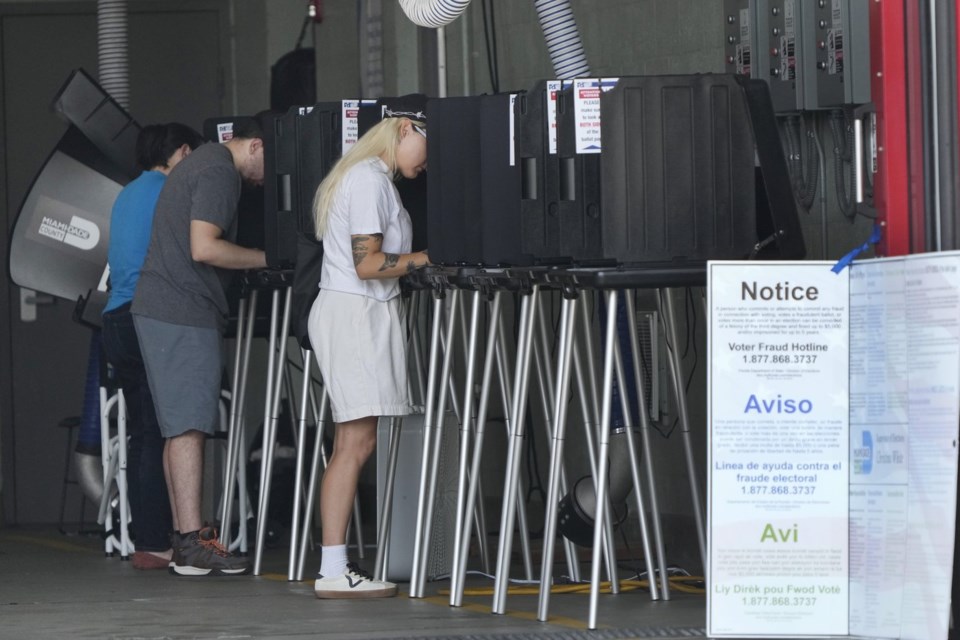TALLAHASSEE, Fla. (AP) — Every day that a new Florida law remains on the books restricting the state’s process to get citizens’ initiatives on the ballot, the First Amendment rights of campaigners are being infringed upon, their attorneys argued in court Thursday.
The lawyers claim the measure signed into law by Republican Gov. Ron DeSantis this month has already dealt significant blows to campaigns to expand Medicaid and legalize recreational marijuana in the state. Organizers for the measures are urging a judge to block portions of the law from being enforced while their challenge plays out in court.
Both campaigns are gathering signatures in the hopes of getting their initiatives on the 2026 ballot, a prospect they say could be effectively impossible under the new law, which creates criminal penalties for campaigners who don't comply with its stricter requirements.
Nick Steiner, an attorney for the Southern Poverty Law Center who's representing the Medicaid expansion group Florida Decides Healthcare, said the law creates an “insurmountable barrier” for the campaign.
“The harm is compounding every day,” Steiner added.
Under the new law, campaigns have 10 days instead of the previous 30 to return signed petition forms to local elections officials. They face stiffer fines if they don’t return the petitions on time, or send them to the wrong county. And volunteers could be charged with a felony if they collect more than 25 signed ballot petitions, other than their own or those of immediate family members, and don’t register with the state as a petition circulator.
Lawmakers argue that the new restrictions are needed to reform a process they claim has been tainted by fraud. The Republican-controlled Legislature pushed the changes months after a majority of Florida voters supported ballot initiatives to protect abortion rights and legalize recreational marijuana, though the measures fell short of the 60% needed to pass.
The new law is designed to “undercut the success” of the previous ballot measures, argued attorney Glenn Burhans, who's representing the recreational marijuana campaign group Smart & Safe Florida.
Mohammad Jazil, an attorney representing Secretary of State Cord Byrd, defended the law, saying “these aren't draconian fines and penalties that are going to lead to ruin." Still, he acknowledged the seriousness of Floridians risking felony charges — and their right to vote — if they run afoul of the law while working for a political campaign, saying “getting arrested is a big deal.”
Since the first aspects of the law took effect May 2, the campaigns say they've seen their volunteer forces shrink and the number of weekly signatures they collect plummet.
At times, U.S. District Judge Mark Walker appeared amenable to the campaigns' arguments. Walker is known for his colorful commentary in court — and has been a vocal critic of DeSantis' policies.
Prompted by Jazil's defense of the Legislature's “sausage making," Walker continued with an extended metaphor about what lawmakers have been cooking up — and whether it's legally palatable.
“Sometimes the sausage isn't real tasty,” said Walker. Sometimes, he said, it's “nasty.”
The question for the court to decide, Jazil replied, isn't whether the sausage tastes good, but whether it's edible.
“Your honor, the sausage is not only bad, it's rancid and filled with maggots," Burhans countered. “And it should be enjoined.”
Walker declined to rule from the bench Thursday, saying he'll draft his ruling as soon as he can.
___ Kate Payne is a corps member for The Associated Press/Report for America Statehouse News Initiative. Report for America is a nonprofit national service program that places journalists in local newsrooms to report on undercovered issues.
Kate Payne, The Associated Press



